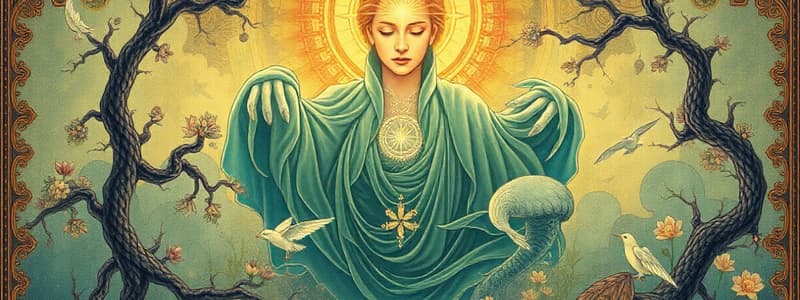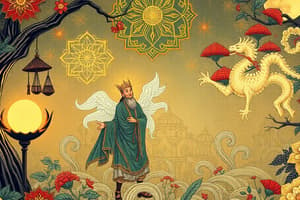Podcast
Questions and Answers
Basic transportation is considered a need.
Basic transportation is considered a need.
True (A)
Exotic travel falls under the category of needs.
Exotic travel falls under the category of needs.
False (B)
Clothing is one of the essential needs for survival.
Clothing is one of the essential needs for survival.
True (A)
Jewelry is classified as a need for survival.
Jewelry is classified as a need for survival.
Education is considered a need.
Education is considered a need.
The Ego, according to Freud, represents the moral conscience and internalized societal rules.
The Ego, according to Freud, represents the moral conscience and internalized societal rules.
Freud believed that sexual energy, or libido, is a primary driving force in human behavior.
Freud believed that sexual energy, or libido, is a primary driving force in human behavior.
Testosterone is the primary hormone responsible for the development of secondary sex characteristics in females.
Testosterone is the primary hormone responsible for the development of secondary sex characteristics in females.
Collectivist cultures prioritize group harmony over personal goals.
Collectivist cultures prioritize group harmony over personal goals.
Vasectomy is a form of contraception that prevents the release of eggs from the ovaries.
Vasectomy is a form of contraception that prevents the release of eggs from the ovaries.
Sexually transmitted diseases (STDs) can only be spread through vaginal sex.
Sexually transmitted diseases (STDs) can only be spread through vaginal sex.
The Tao Te Ching focuses on the teachings of Lao Tzu regarding the 'Dao' or 'Way.'
The Tao Te Ching focuses on the teachings of Lao Tzu regarding the 'Dao' or 'Way.'
Nirvana in Buddhism is considered a state of suffering and despair.
Nirvana in Buddhism is considered a state of suffering and despair.
Using a condom during every sexual encounter is a highly effective way to prevent STDs.
Using a condom during every sexual encounter is a highly effective way to prevent STDs.
Hinduism is a polytheistic religion with multiple deities to worship.
Hinduism is a polytheistic religion with multiple deities to worship.
Secondary sex characteristics are physical traits that directly relate to reproduction.
Secondary sex characteristics are physical traits that directly relate to reproduction.
Implantable contraceptives protect against sexually transmitted infections.
Implantable contraceptives protect against sexually transmitted infections.
A homozygous recessive genotype has two different alleles for a gene.
A homozygous recessive genotype has two different alleles for a gene.
The Analects is a compilation of teachings attributed to Confucius.
The Analects is a compilation of teachings attributed to Confucius.
William Sheldon's Body-type Theory categorizes ectomorphic individuals as typically overweight and sedentary.
William Sheldon's Body-type Theory categorizes ectomorphic individuals as typically overweight and sedentary.
Humans typically have 46 chromosomes organized into 23 pairs.
Humans typically have 46 chromosomes organized into 23 pairs.
Flashcards
Needs
Needs
Essential things for survival and well-being, including food, shelter, water, and healthcare.
Wants
Wants
Desires or things that are not necessary for survival, but that people like to have.
Examples of Needs
Examples of Needs
Basic necessities like food, shelter, water, clothing, healthcare, education, safety, and others important for a healthy life.
Examples of Wants
Examples of Wants
Signup and view all the flashcards
Needs vs. Wants
Needs vs. Wants
Signup and view all the flashcards
Individualism
Individualism
Signup and view all the flashcards
Collectivism
Collectivism
Signup and view all the flashcards
Taoism
Taoism
Signup and view all the flashcards
Yin and Yang
Yin and Yang
Signup and view all the flashcards
Four Noble Truths
Four Noble Truths
Signup and view all the flashcards
Dharma
Dharma
Signup and view all the flashcards
Samsara
Samsara
Signup and view all the flashcards
Moksha
Moksha
Signup and view all the flashcards
Ego (Freud)
Ego (Freud)
Signup and view all the flashcards
Libido
Libido
Signup and view all the flashcards
Thanatos
Thanatos
Signup and view all the flashcards
Oedipus Complex
Oedipus Complex
Signup and view all the flashcards
Resolution of the Oedipus Complex
Resolution of the Oedipus Complex
Signup and view all the flashcards
Secondary Sex Characteristics
Secondary Sex Characteristics
Signup and view all the flashcards
Hormonal Role in Sex Characteristics
Hormonal Role in Sex Characteristics
Signup and view all the flashcards
Erogenous Zones
Erogenous Zones
Signup and view all the flashcards
Study Notes
True or False Questions
- Individualism emphasizes personal independence and self-reliance.
- Collectivist cultures prioritize personal goals over group harmony.
- Taoism emphasizes the importance of ego in achieving self-realization.
- The Tao Te Ching is a collection of Lao Tzu's teachings on the "Dao" or "Way."
- Taoism views the world as inherently flawed and chaotic.
- The Yin and Yang symbol represents the interconnectedness and balance of opposing forces.
- Buddhism is not a theistic religion with a supreme god.
- The Four Noble Truths are the foundation of Buddha's teachings.
- Nirvana is a state of inner peace and wisdom, not suffering.
- Hinduism is not a monotheistic religion; it's polytheistic with multiple deities.
- Dharma is one's duty and righteousness in Hinduism.
- Samsara is the cycle of birth, death, and rebirth in Hinduism.
- A homozygous recessive genotype has two identical recessive alleles for a gene.
- Moksha is the ultimate goal of Hinduism, representing liberation from suffering.
- Confucianism is not a monotheistic religion.
- Confucius was a Chinese philosopher.
- The Analects is a collection of Confucius's teachings.
- The Book of Changes is one of the Confucian Classics.
- Confucianism emphasizes social harmony and ethical conduct.
- The Five Classics are fundamental to early Confucianism.
- Confucius was born in Qufu, Shandong Province, China.
- Genotype refers to the genetic information, and phenotype is its physical expression.
- A homozygous dominant genotype has two identical dominant alleles for a gene.
- A heterozygous genotype has two different alleles for a gene.
- Humans have 23 pairs of chromosomes.
- DNA contains the genetic instructions for development.
- Maturation is the completion of genetic character growth.
- The Theory of Physiognomy suggests that facial features show character.
- Hippocrates' theory of body fluids connects temperament to fluid balance.
- William Sheldon's Body-type Theory categorizes body types.
- Sigmund Freud founded psychoanalysis.
- The Id operates on the pleasure principle; the Ego operates on reality.
- The Ego represents the moral conscience; the Superego is the internalized societal rules.
- Freud believed sexual energy (libido) is crucial.
- The death drive (Thanatos) represents aggression and destruction.
- Secondary sex characteristics relate to reproduction.
- A lower voice in males is a secondary sex characteristic.
- Breast growth is a secondary sex characteristic in females.
- Development of secondary sex characteristics is hormonally driven.
- Testosterone drives male secondary characteristics.
- Erogenous zones are areas with heightened sexual sensitivity.
- Men and women have different erogenous zone distributions.
- The clitoris is considered a highly sensitive erogenous zone for both sexes; it is not just for women.
- Sexually transmitted diseases can be spread via skin-to-skin contact.
- Condoms are highly effective in preventing STDs.
- Vasectomy and implantable contraceptives prevent conception.
- The reproductive cycle involves vasocongestion and myotonia.
- The resolution phase has a refractory period for both sexes.
Multiple Choice Questions
- Core value of individualism: Personal Independence
- Definition of self in collectivist cultures: Relationships with others
- "Knowing the self" in Taoism: Enlightenment
- Tao Te Ching emphasizes: Harmony with the "Dao"
- Principle taught by Lao Tzu: Embracing human experience(not ego)
- Yin and Yang symbol: Interconnectedness and balance
- Core belief of Buddhism: Enlightenment through meditation
- Nirvana in Buddhism: Inner peace and wisdom
- Core belief of Hinduism: Cycle of Rebirth
- Moksha in Hinduism: Liberation from suffering
- The Hindu trinity: Brahma, Vishnu, and Shiva
- Key practice in Hinduism: Meditation
- Confucianism is: A philosophy, religion, and way of life
- Founder of Confucianism: Confucius
- Analects: Collection of Confucius' teachings.
Additional Information
- Genetic information shaping characteristics: Genotype
- Types of genotypes include homozygous dominant, heterozygous, and homozygous recessive.
- Freud's psychoanalytic theory includes the Id, Ego, and Superego.
- Oedipus complex: Unconscious desire for opposite sex parent.
- Secondary sex characteristics relate to reproduction.
- Erogenous zones are areas with heightened sexual sensitivity.
- STDs: Sexually Transmitted Diseases.
- Contraception methods and effectiveness
- Vasocongestion: Swelling of body tissues due to increased blood flow.
Studying That Suits You
Use AI to generate personalized quizzes and flashcards to suit your learning preferences.




